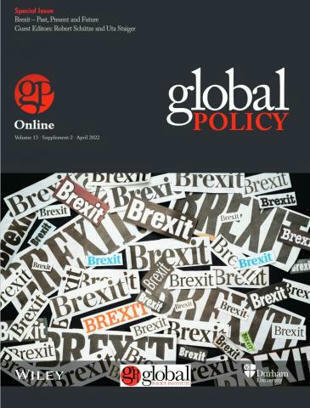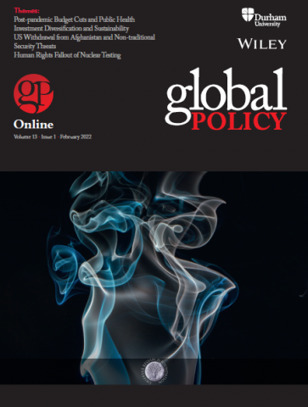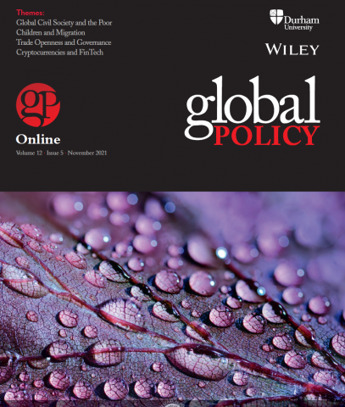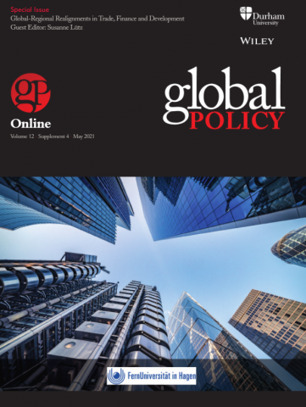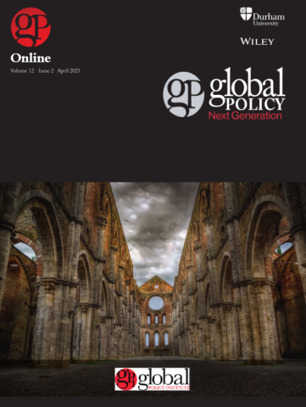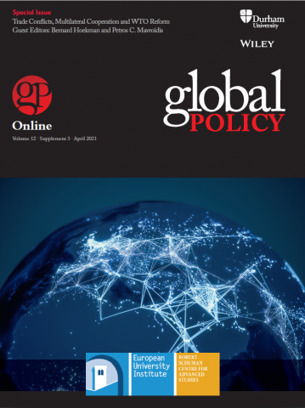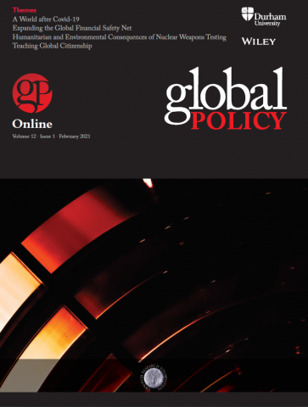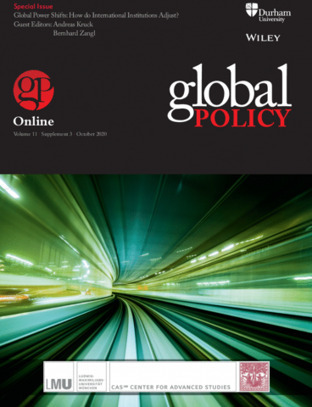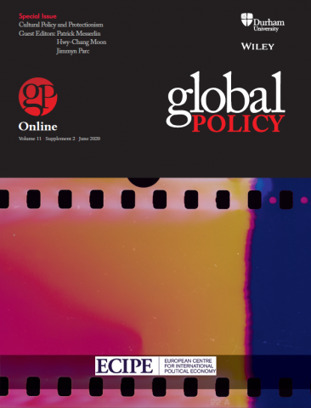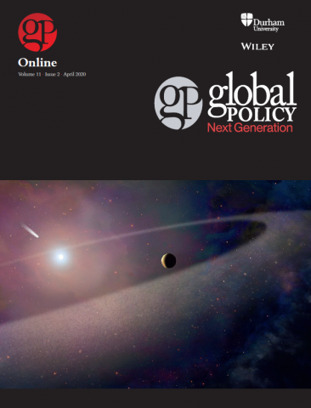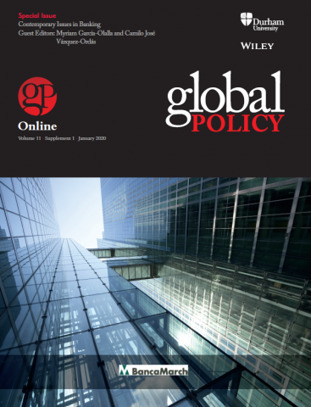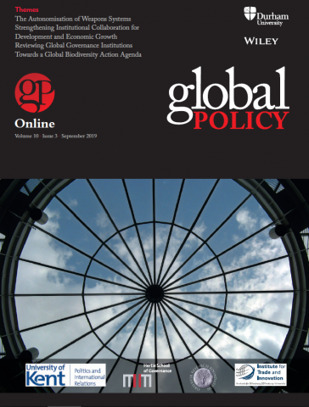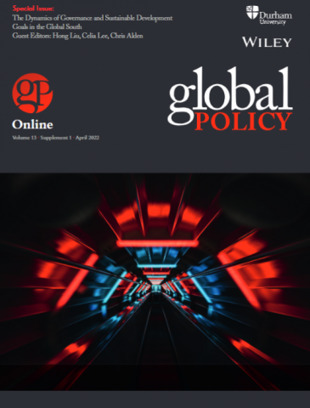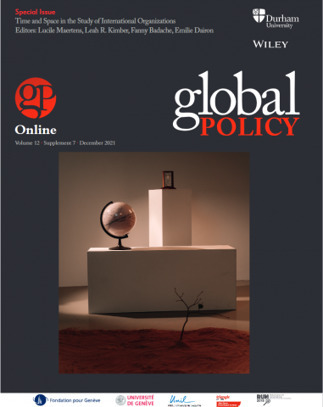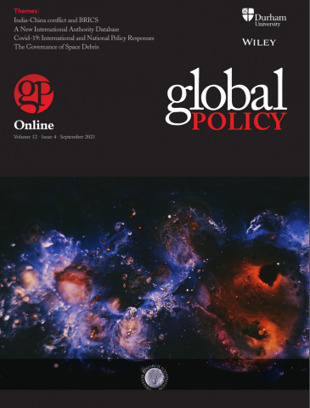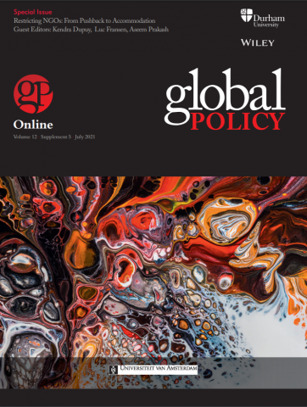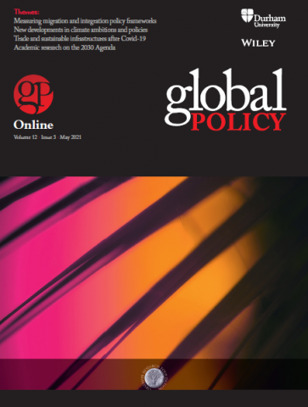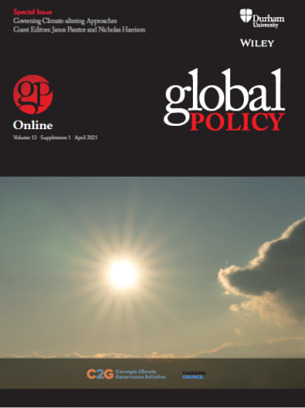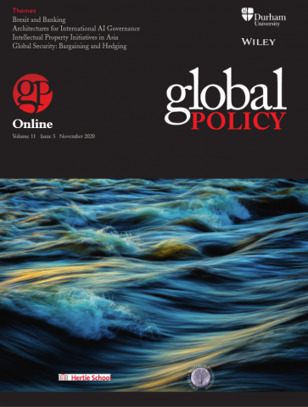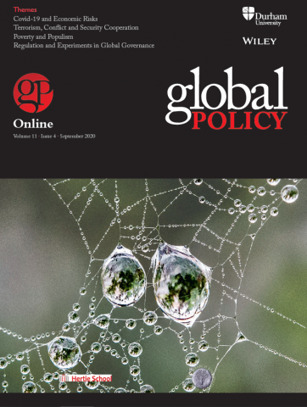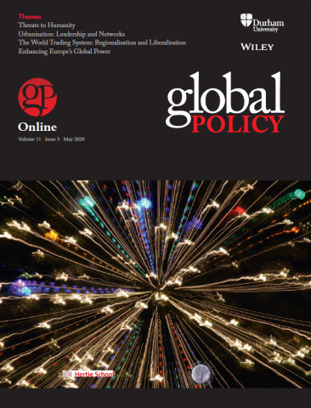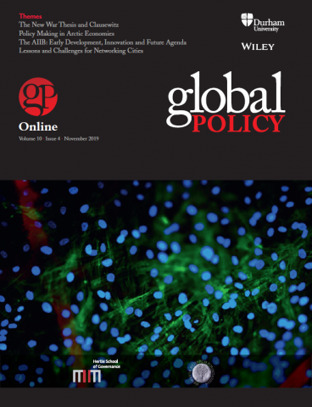 Your new post is loading...
Special Issue: Brexit - Past, Present and Future Half a decade after the referendum, the authors in this special issue of Global Policy set out to consider Brexit from a wide diachronic perspective to examine not only its complicated present, but also its past and possible future(s). The special issue's three sections contain four articles each, plus a special spotlight on the Irish border and the Ireland/Northern Ireland Protocol. Experts in history, law, political and social science gauge the ideational factors and historical pathways that prepared the way for Brexit; discuss the significance of some of the legal, formal and constitutional features of the process; and indicate probable consequences going forward. They aim to do justice to the idiosyncrasies of the UK’s exit from the EU and to draw out its wider repercussions and significance. Introduction The Past, Present and Future of Brexit: An Introduction - Uta Staiger, Robert Schütze Past Destined to Brexit? British Pathways to Membership in the European Communities 1945–73 - Wolfram Kaiser Beyond 1973: UK Accession and the Origins of EC Consumer Policy - Brigitte Leucht Margaret Thatcher and the Single European Act - Stephen Wall Britain in the European Union: A Very Short History - Robert Schütze Present Legislating for Brexit: ‘The People’ versus Parliament? - Adam Cygan Brexit and the United Kingdom's Devolutionary Constitution - Roger Masterman Was Brexit a Form of Secession? - Eleni Frantziou Brexit: What Role did Process Play? - Brigid Laffan Future Taking Back Control as Democratic Theory - Albert Weale Brexit Sovereignty and its Dead Ends - Piet Eeckhout Movement of Goods under the TCA - Catherine Barnard, Emilija Leinarte Brexit and the Environment Bill: The Future of Environmental Accountability - Maria Lee Spotlight The Protocol on Ireland/Northern Ireland: Past, Present, and Future Precariousness - Katy Hayward, Milena Komarova Release Date 29 April 2022
Vol 13, Issue 1, March 2022 The March 2022 issue of Global Policy includes research articles on, among others, post pandemic budget cuts, low carbon equity markets, corporate tax abuse, human rights and the limits to China's ride. There is also a practitioners’ special section on Afghanistan, regional powers and non-traditional security challenges edited by Raj Verma. The issue is concluded by a policy insight on sustainable transformations and a review essay on weakness as a weapon. Research Articles Austerity Redux: The Post-pandemic Wave of Budget Cuts and the Future of Global Public Health - Alexander Kentikelenis and Thomas Stubbs A Practical Proposal to end Corporate Tax Abuse: METR, a Minimum Effective Tax Rate for Multinationals - Alex Cobham, Tommaso Faccio, Javier Garcia-Bernardo, Petr Janský and Jeffery Kadet, Sol Picciotto The Low-carbon Equity Market: A New Alternative for Investment Diversification? - Vítor Manuel de Sousa Gabriel, María Belén Lozano and Maria Fernanda Ludovina Inácio Matias Contextualizing Donors’ Interests: The United Nations’ Shaming of the United States’ Trade Partners - Sara Kahn-Nisser Comparative Fortunes of Ecosystem Services as an International Governance Concept - Jen Iris Allan, Graeme Auld, Timothy Cadman and Hayley Stevenson Human Rights Fallout of Nuclear Detonations: Reevaluating ‘Threshold Thinking’ in Assisting Victims of Nuclear Testing - Matthew Breay Bolton The Limits to China's Peaceful Rise – Deep Integration and a New Cold War - Jianyong Yue Practitioners’ Special Section on Afghanistan Edited by Raj Verma Afghanistan, regional powers and non-traditional security threats and challenges - Raj Verma Picking up the Pieces in Afghanistan: Need for Smarter Diplomacy and Targeted Counterterrorism - Lisa Curtis Non-traditional Security Threats to India from Afghanistan? - Manoj Joshi The Taliban’s Takeover of Afghanistan and Pakistan’s Non-traditional Security Challenges - Zahid Shahab Ahmed China’s Alternative Prudent Approach in Afghanistan - Haibin Niu and Yuehan Huang Russia, Central Asia and Non-traditional Security Threats from Afghanistan following the US Withdrawal - Ekaterina Stepanova Iran’s Nontraditional Security Challenges under the Taliban Rule - Mohsen Solhdoost and Mahmoud Pargoo Instability in Afghanistan and Non-traditional Security Threats: A Public Good Problem? - Raj Verma Policy Insights Towards a Portfolio Approach: Partnerships for Sustainable Transformations - David Horan Review Essay When is Weakness a Weapon? - Charles B. Roger Release Date 14 March 2022
Vol 12, Issue 5, November 2021 The November 2021 issue of Global Policy includes research articles on, among others, representation in global civil society, techno-solutionism and the pandemic, child migration, foreign aid and fragile states, and cybersecurity and digital trade. There are also two policy insights on cryptocurrencies and central banks, and fintech's possibilities for sustainable development. Research Articles In Whose Name Are You Speaking? The Marginalization of the Poor in Global Civil Society - Carole-Anne Sénit and Frank Biermann Children & Migration: Political Constructions and Contestations - Lesley J. Pruitt Drone Use for COVID-19 Related Problems: Techno-solutionism and its Societal Implications - Bruno Oliveira Martins, Chantal Lavallée and Andrea Silkoset Come In, We’re Open (and Flexible): Trade Openness, Labour Flexibility, and Varieties of Capitalism - Walid Tijerina A Systematic Framework to Understand Transnational Governance for Cybersecurity Risks from Digital Trade - Keman Huang, Stuart Madnick, Nazli Choucri and Fang Zhang A Paradox of New Deal and Foreign Aid for Fragile States in Sub-Saharan Africa - Ben Katoka and Huck-ju Kwon Assessing the Development–Foreign Policy Nexus of the Asian Rising Powers: South Korea, China, Japan and Indonesia - Emel Parlar Dal, Samiratou Dipama, Şaban Çaytaş and Ayda Sezgin Policy Insights Cryptocurrencies and CBDC: The Route Ahead - Marion Laboure, Markus H.-P. Müller, Gerit Heinz, Sagar Singh and Stefan Köhling The FinTech Dividend: How Much Money Is FinTech Likely to Mobilize for Sustainable Development? - Bryane Michael and Tamara Latkovska Release Date 22 November 2021
Special Issue - Digital Technology and the Political Determinants of Health Inequities This special issue analyzes the global rise of digital health technologies and identifies how they impact, both positively and negatively, inequities. It brings together diverse perspectives from academics, policy makers, practitioners and activists from around the world. Their contributions engage with empirical data and practical experiences from Africa (Ghana, Tanzania, Kenya, South Africa, Sierra Leone), Asia (India), Europe (Germany, Norway, the European Union), and North America (the United States and Canada). Taken together and individually, they critically interrogate the political dimensions that link digital technologies and health equity. Introduction Digital Technology and the Political Determinants of Health Inequities: Special Issue Introduction - Katerini Tagmatarchi Storeng, Sakiko Fukuda-Parr, Manjari Mahajan and Sridhar Venkatapuram Research Articles 21st Century Capitalism and Innovation for Health - Susan K. Sell Governing Artificial Intelligence in an Age of Inequality - Padmashree Gehl Sampath Emerging Consensus on ‘Ethical AI’: Human Rights Critique of Stakeholder Guidelines - Sakiko Fukuda-Parr and Elizabeth Gibbons From Ghana to India, Saving the Global South’s Mothers with a Digital Solution - Marine Al Dahdah The Appropriated Body: Biometrics Regime, The Digital State and Healthcare in Contemporary India - Rajiv K. Mishra Digital Health in East Africa: Innovation, Experimentation and the Market - Tom Neumark and Ruth J. Prince Policy Insights What’s Technology Got to Do With It? Power, Politics, and Health Equity Beyond Technological Triumphalism - Andrea A. Cortinois and Anne-Emanuelle Birn The Too-Narrow Policy Debate: Lessons from Agricultural Biotechnology for Digital Technology - Manjari Mahajan Mining the Data Oceans, Profiting on the Margins - Mary F. E. Ebeling The Dangers of Data Colonialism in Precision Public Health - Kadija Ferryman The Big Digital Contact Tracing Experiment - Antoine de Bengy Puyvallée and Katerini Tagmatarchi Storeng COVID-Apps: Misdirecting Public Health Attention in a Pandemic - Susan Erikson Algorithmic Bias and the (False) Promise of Numbers - Adam Moe Fejerskov Practitioner Commentaries Claiming Digital Technology for Health Equity: Early Lessons from Promising Practices in India - Jashodhara Dasgupta Digital Health in Response to COVID-19 in Low- and Middle-income Countries: Opportunities and Challenges - Elizabeth A. Mitgang, Joaquin A. Blaya and Mickey Chopra Avoiding the Road to Nowhere: Policy Insights on Scaling up and Sustaining Digital Health - Amnesty LeFevre, Sara Chamberlain, Neha S. Singh, Kerry Scott, Purnima Menon, Peter Barron, Rajani R. Ved and Asha George Release Date 10 August 2021
Special Issue - Global‐Regional Realignments in Trade, Finance and Development Release Date 20 June 2021
Vol 12, Issue 2, April 2021 Release Date 30 April 2021
Special Issue - Trade Conflicts, Multilateral Cooperation and WTO Reform The articles in this Global Policy special issue, edited by Bernard Hoekman and Petros C. Mavroidis, cover trade conflicts, multilateral cooperation and World Trade Organisation (WTO) reform. Since its formation, with a few notable exceptions, the WTO's members have not been able to negotiate new rules on policies. The Doha Development Agenda negotiations, launched in 2001, quickly became deadlocked, and other functions, such as its dispute settlement mechanism, are also not performing well. Calls for WTO reform have, therefore, been mounting. These issues and more are unpick by contributors. Special Issue Articles WTO Reform: Back to the Past to Build for the Future - Bernard Hoekman and Petros C. Mavroidis Stakeholder Preferences and Priorities for the Next WTO Director General - Matteo Fiorini, Bernard Hoekman, Petros C. Mavroidis, Douglas Nelson and Robert Wolfe Is the WTO in Sync with the Business Community? - Elissa Alben and Logan Brown Informal Learning and WTO Renewal Using Thematic Sessions to Create More Opportunities for Dialogue - Robert Wolfe All the Tea in China: Solving the ‘China Problem’ at the WTO - Petros C. Mavroidis and André Sapir Plurilateral Cooperation as an Alternative to Trade Agreements: Innovating One Domain at a Time - Bernard Hoekman and Charles Sabel Why Reform is Needed: WTO ‘Public Body’ Jurisprudence - Dukgeun Ahn Appointment with Destiny: Selecting WTO Judges in the Future - Robert Howse The Role of the WTO Secretariat in WTO Disputes – Silent Witness or Ghost Expert? - Jasper M. Wauters Release Date 28 April 2021
Vol 12, Issue 1, February 2021 The February 2021 issue of Global Policy includes research articles on, among others, a Post‐COVID‐19 United Nations, power and multilateral development banks, big science collaborations, and club‐based climate regime and OECD negotiations. There is also a special section on the humanitarian and environmental consequences of nuclear weapons. The issue concludes with policy insights on teaching global citizenship, expanding the global financial safety net in response to COVID-19, and the EU in the face of Chinese expansionism. Research Articles The ‘Third’ UN: Imagining Post‐COVID‐19 Multilateralism - Tatiana Carayannis and Thomas G. Weiss The Enlarged Global Financial Safety Net - Evgeny Vinokurov and Artem Levenkov Power Structure Dynamics in Growing Multilateral Development Banks: The Case of the Asian Infrastructure Investment Bank - Hang Luo, Lize Yang and Kourosh Houshmand The Club‐based Climate Regime and OECD Negotiations on Restricting Coal‐fired Power Export Finance - Jessica C. Liao Internet Fragmentation, Political Structuring, and Organizational Concentration in Transnational Engineering Networks - David Weyrauch and Thomas Winzen Big Science Collaborations; Lessons for Global Governance and Leadership - Mark Robinson Special Section Articles Addressing the Ongoing Humanitarian and Environmental Consequences of Nuclear Weapons: An Introductory Review - Matthew B. Bolton and Elizabeth Minor Policy Approaches Addressing the Ongoing Humanitarian and Environmental Consequences of Nuclear Weapons: A Commentary - Nate Van Duzer and Alicia Sanders‐Zakre Addressing the Humanitarian and Environmental Consequences of Atmospheric Nuclear Weapon Tests: A Case Study of UK and US Test Programs at Kiritimati (Christmas) and Malden Islands, Republic of Kiribati - Becky Alexis‐Martin, Matthew Breay Bolton, Dimity Hawkins, Sydney Tisch and Talei Luscia Mangioni Commentary on Addressing the Legacies of Nuclear Weapons Use and Testing: Perspectives from Survivors - Elizabeth Minor, Hana Umezawa, Terumi Tanaka, Sueichi Kido and Dmitriy Vesselov A Singular Opportunity: Setting Standards for Victim Assistance under the Treaty on the Prohibition of Nuclear Weapons - Bonnie Docherty Policy Insights Teaching Global Citizenship: The Global Leadership Initiative, its Impact and Challenges - Hugo Dobson, Matthew L. Bishop, Charis Enns, Philipp Horn and Gregory Stiles Safety First: Expanding the Global Financial Safety Net in Response to COVID‐19 - Kevin P. Gallagher, Haihong Gao, William N. Kring and José A. Ocampo Ulrich Volz The EU in Search of Autonomy in the Era of Chinese Expansionism and COVID‐19 Pandemic – Sebastian Santander and Antonios Vlassis A World after COVID‐19: Business as Usual, or Building Bolder and Better? - Walter R. Erdelen and Jacques G. Richardson Practitioner Commentary Virtual, Augmented and Mixed Reality: What are the Benefits for SMEs? - Valentina Amuso, Giuliano Poletti and Donato Montibello Release Date 19 February 2021
Special Issue - Global Power Shifts: How do International Institutions Adjust? Shifts in the international distribution of power create an impetus for institutional change. As powers such as China rise and powers such as the US decline, international institutions come under pressure to adapt to new power realities. Yet, the pathways to institutional adaptation vary considerably. What is more, sometimes attempts at institutional adaptation are successful and sometimes they fail. To contribute to a better understanding of such events, this special issue theorizes states and institutions' responses to global power shifts, and provides case studies that explore their attempts to adapt to new realities, gain legitimacy for their actions, cooperate with and see off competitors. Its contributors also discuss the broader implications of their research for the future of the international order and the management of global power shifts. Special Issue Articles The Adjustment of International Institutions to Global Power Shifts: A Framework for Analysis - Andreas Kruck and Bernhard Zangl How Do States Renegotiate International Institutions? Japan’s Renegotiation Diplomacy Since World War II - Phillip Y. Lipscy US Strategies of Institutional Adaptation in the Face of Hegemonic Decline - Lora Anne Viola Informal IGOs as Mediators of Power Shifts - Felicity Vabulas and Duncan Snidal The Integration of Emerging Powers into Club Institutions: China and the Arctic Council - Matthew D. Stephen and Kathrin Stephen Emerging Powers and Differentiation in Global Climate Institutions - Alexander Thompson Rhetorical Appeals and Strategic Cooptation in the Rise and Fall of The New International Economic Order - Orfeo Fioretos Revolution from the Inside: Institutions, Legitimation Strategies, and Rhetorical Pathways of Institutional Change - Stacie E. Goddard Rising Powers, UN Security Council Reform, and the Failure of Rhetorical Coercion - Martin Binder and Monika Heupel ‘Most Potent and Irresistible Moral Influence’: Public Opinion, Rhetorical Coercion, and the Hague Conferences - Paul K. MacDonald The Legitimacy of International Institutions among Rising and Established Powers - Jonas Tallberg and Soetkin Verhaegen Release Date 17 November 2020
Special Issue - Cultural Policy and Protectionism Release Date 08 July 2020
Vol 11, Issue 2, April 2020 Release Date 17 April 2020
Special Issue - Contemporary Issues in Banking The financial crisis revealed limitations and deficiencies in the corporate governance of financial institutions on both sides of the Atlantic. Policy responses have introduced regulations focused on: greater oversight of risk‐taking; tougher capital and liquidity requirements; greater transparency on the remuneration packages paid to directors and senior management; and new rules on the composition of such packages. Banks have also been forced to boost capital, hold more liquidity and to implement improved risk, pay and operational oversight. Many have consequently taken greater interest in promoting good practices, strengthening corporate governance, fostering transparency and increasing sensitivity to environmental and socioeconomic issues. This special issue of Global Policy contributes to ongoing debates by analysing these and newer movements within the global banking industry. Special Issue Articles Banca March: The Fundamentals of a Bank Linked to Its Customers and Committed to Society - Rita Rodríguez Arrojo Introduction to the Special Issue: ‘Contemporary Issues in Banking’ - Myriam García‐Olalla and Camilo José Vázquez-Ordás The Effect of Banks' IT Investments on the Digitalization of their Customers - Santiago Carbó‐Valverde, Pedro J. Cuadros‐Solas, Francisco Rodríguez‐Fernández and EY The Impact of Corporate Sustainability and Digitalization on International Banks’ Performance - Francisco Javier Forcadell, Elisa Aracil and Fernando Úbeda The Role of Capital and Liquidity in Bank Lending: Are Banks Safer? - Salvatore Polizzi, Enzo Scannella and Nuria Suárez Does the Single Supervisory Mechanism Reduce Overall Risk in the European Stock Market? - Pilar Abad, Myriam García‐Olalla and M. Dolores Robles How Corporate Governance Mechanisms of Banks Have Changed After the 2007–08 Financial Crisis - José L. Fernández Sánchez, María D. Odriozola Zamanillo and Manuel Luna A Behavioral Perspective on Saving Decisions. Empirical Evidence for Policymakers in the European Union - Judith Clifton, Daniel Díaz‐Fuentes and Gonzalo Llamosas García Misconduct and Risk Climate in Banking: Development of a Multidimensional Measurement Scale - Beatriz Fernández Muñiz, José Manuel Montes Peón and Camilo José Vázquez Ordás The European Financial Crisis and Firms' Cash Holding Policy: An Analysis of the Precautionary Motive - Maria Belén Lozano and Serhat Yaman Release Date 23 January 2020
Vol 10, Issue 3, September 2019 Release Date 29 September 2019
|
Special Issue - The Dynamics of Governance and Sustainable Development Goals in the Global South This special issue, edited by Hong Liu, Celia Lee, Chris Alden, on ‘The Dynamics of Governance and Sustainable Development Goals in the Global South’ aims to contribute to, expand upon and advance the transnational knowledge transfer literature. It also hopes to develop an outcome-driven knowledge and policy transfer model for the SDGs. The articles were selected from papers first presented at the London School of Economics – IDEAS and Nanyang Technological University – Nanyang Centre for Public Administration (LSE-IDEAS and NTU-NCPA) Joint Workshop on the Dynamics of Knowledge Transfer and Governance in the Global South, held at the London School of Economics in November 2019. Introduction The Dynamics of Governance and Sustainable Development Goals in the Global South - Hong Liu, Celia Lee, Chris Alden Research Articles China engages the Global South: From Bandung to the Belt and Road Initiative - Hong Liu Sensemaking and Sustainable Development: Chinese Overseas Acquisitions and the Globalisation of Traditional Chinese Medicine - Peng Wang, Eugenia Yijun Xing, Xiaotao Zhang, Yipeng Liu Foreign Investment and Upgrading in the Garment Sector in Africa and Asia - Linda Calabrese, Neil Balchin Knowledge Transfer in the Global South: Reusing or Creating Knowledge in China’s Special Economic Zones in Ethiopia and Cambodia? - Ana Cristina Alves, Celia Lee Convergence or Divergence? China Invested Firms’ E&E Evaluation of CSR in Southeast Asia - Jianxun Kong, Yidi Zhou Polycentric Urbanization and Sustainable Development in China - Eric J. Heikkila, Ying Xu Policy Insight Sustainable Development Goals and their Fit with Good Governance - Andrew Massey Book Review Food Insecurity in Small Island Developing States - Michael W. Charney Release Date 14 April 2022
Special Issue - Time and Space in the Study of International Organizations This special issue applies an original lens to an overlooked aspect of international organizations (IO) research, bringing (temporary) findings, but also suggesting multiple avenues for further research. It considers IOs as co-constitutive of multilateralism and investigates three main questions: (i) How are IOs influenced by time and space? (ii) How are time and space experienced within IOs? (iii) How do IOs influence time and space around them? Targeting Global Policy's broad and diverse audience, the issue's articles address both IO scholars and practitioners, encouraging them to reflect on their everyday experience of IOs and daily professional practices. Through its broad focus, it also intends to nourish ongoing discussions on the politics of time and space more broadly. Special Issue Articles Time and space in the study of international organizations: An introduction - Lucile Maertens, Leah R. Kimber, Fanny Badache, Emilie Dairon Experiencing Time and Space within the United Nations - Leah R. Kimber, Lucile Maertens Understanding International Organizations’ Headquarters as Ecosystems: The Case of Geneva - Emilie Dairon, Fanny Badache Focal Times and Spaces: How Ethnography Foregrounds the Spatiotemporality of International Organizations and Global Governance - Julian Eckl 'Your Own Space and Time': Spatiality and Temporality in the Study of the International Organisations of the Middle East - James Worrall Understanding Change in International Organizations Across Time and Spaces: The Rise of UN Country Teams - Luciana Campos Humanitarian Planning and Localised Temporalities: The Haitian Case - Jan Verlin Controversial Practices: Tracing the Proceduralization of the IPCC in Time and Space - Kari De Pryck Release Date 31 December 2021
Vol 12, Issue 4, September 2021 Release Date 20 September 2021
Special Issue - Restricting NGOs: From Pushback to Accommodation Since the mid-2000s, scholars, policy makers, and activists have been sounding alarm bells over the growing tendency of governments around the globe to restrict the ability of civil society groups to form, operate, advocate for particular causes, receive and use resources, and network with other actors. The contributions in this special issue examine how particular types of civil society organizations are impacted by this clampdown, how restrictions can change the balance between civil society actors with rival ideological perspectives, how restrictions can enable the rise of new civil society actors attacking existing CSOs, and how restrictions can shape popular attitudes and donor funds. Importantly, the contributions in this issue also shed light on how organizations attempt to push back against restrictive states. Special Issue Article: Introduction Restricting NGOs: From Pushback to Accommodation - Kendra Dupuy, Luc Fransen and Aseem Prakash Special Issue Articles Tempering Transnational Advocacy? The Effect of Repression and Regulatory Restriction on Transnational NGO Collaborations - Luc Fransen, Kendra Dupuy, Marja Hinfelaar, Sultan Mohammed and Zakaria Mazumder The Selective Closure of Civic Space - Conny Roggeband and Andrea Krizsán The Enemy Within? Anti-Rights Groups and Restrictions on Civil Society - Ines M. Pousadela and Dominic R. Perera Who Cares about Crackdowns? Exploring the Role of Trust in Individual Philanthropy - Suparna Chaudhry, Marc Dotson and Andrew Heiss The Implications of Closing Civic Space for Hunger and Poverty in the Global South - Naomi Hossain and Marjoke Oosterom A Platform or Partner: Engaging the Media in Advocacy - Lisa-Marie Selvik Defending Civic Space: Successful Resistance Against NGO Laws in Kenya and Kyrgyzstan - Nora Berger-Kern, Fabian Hetz, Rebecca Wagner and Jonas Wolff Don’t Touch My Constitution! Civil Society Resistance to Democratic Backsliding in Africa´s Pluralist Regimes - Lise Rakner Refraining or Resisting: Responses of Green Movement Supporters to Repression During the 2013 Iranian Presidential Elections - Ali Honari and Jasper Muis Release Date 01 August 2021
Vol 12, Issue 3, May 2021 The May 2021 issue of Global Policy includes research articles on, among others, climate change and development, China’s investments, researching the 2030 agenda, reform of the Security Council and environmental justice. There is also a special section on migration policy. The issue concludes with policy insights on carbon pricing, digital services and trade, and China’s AI innovations. It concludes with a practitioner’s commentary on value creation in Latin America. Research Articles Climate Ambition and Sustainable Development for a New Decade: A Catalytic Framework - Sander Chan et al.* Chinese Overseas Investment Policy: Implications for Climate Change - Kelly Sims Gallagher and Qi Qi Treaty Preambles and The Environmental Justice Gap - Michelle Scobie Academic Research on the 2030 Agenda: Challenges of a Transdisciplinary Field of Study - Antonio Sianes The Dahrendorf Quandary, Crisis Severity, and Country Performance - Helmut K. Anheier and Alexandru Filip Projecting General Assembly Voting Records onto an Enlarged Security Council: An Analysis of the G4 Reform Proposal - Jan Niklas Rolf, Niall Juval Janssen and Max Liedtke Special Section on Migration Policy Assembling – Not Reinventing – the Wheel. New Developments in the Field of Migration Policy Indices - Marc Helbling and Giacomo Solano Beyond immigration: Moving from Western to Global Indexes of Migration Policy - Giacomo Solano and Thomas Huddleston Stagnated Liberalization, Long-term Convergence, and Index Methodology: Three Lessons from the CITRIX Citizenship Policy Dataset - Samuel D. Schmid Refugees and Beneficiaries of Subsidiary Protection: Measuring and Comparing Integration Policies - Francesco Pasetti and Carmine Conte Do Diaspora Engagement Policies Endure? An Update of the Emigrant Policies Index (EMIX) to 2017 - Pau Palop-García and Luicy Pedroza Policy Insights Beyond Carbon Pricing: Tax Reform is Climate Policy - Jessica F. Green EU–Asian–American Partnership for a Third Industrial Revolution: Transitioning to High Productivity, Sustainable Infrastructures in the Age of COVID-19 - Vicente Lopez-Ibor Mayor, Fazlun Khalid and Nafeez Mosaddeq Ahmed Digital-based Services Globalization and Multilateral Trade Cooperation - Erik van der Marel China’s Artificial Intelligence Innovation: A Top-Down National Command Approach? - Jinghan Zeng Practitioner Commentary Mañana Today: A Long View of Economic Value Creation in Latin America - Enrique García R and Alvaro Mendez
Special Issue - Precarity, Mobility and the City This special issue contributes to interdisciplinary literature on mobility and precarity in the context of urban studies. Drawing on empirically rich and theoretically grounded case studies, the articles explore ways in which global governmental processes affect mobility and, similarly, how seemingly local movements impact upon global processes. They also address questions of temporality and rhythms of movement as they occur in precarious spaces where lives are directed, controlled, shifted and governed in both structured and contingent ways. The authors take a particular interest in urban spaces to explore how movement plays out, not only within, but also around, towards and away from cities. Three themes run through the case studies in this issue; the regulation of mobility, the representation of space, and relocations of people. Introduction Precarity, Mobility and the City: Introduction to the Special Issue - Jutta Bakonyi, Stefanie Kappler, Eva‐Maria Nag and Lena S. Opfermann Special Issue Articles The Political Economy of Displacement: Rent Seeking, Dispossessions and Precarious Mobility in Somali Cities - Jutta Bakonyi Response Article Unraveling Spaces of Exceptions through Durable Solutions - Teresa Del Ministro Special Issue Articles The ‘Badlands’ of the ‘Balkan Route’: Policy and Spatial Effects on Urban Refugee Housing - Gemma Bird, Jelena Obradovic‐Wochnik, Amanda Russell Beattie and Patrycja Rozbicka Walking in Jozi: Guided Tours, Insecurity and Urban Regeneration in Inner City Johannesburg - Lena S. Opfermann Curating (im)mobility: Peri‐urban agency in the Lwandle Migrant Labour Museum - Stefanie Kappler Commentary: ‘Profitability’, Curated Narratives and Spatial Governance and their Impacts on Urban Migration and the Lives of Migrants - Dyfed Aubrey Disrupting the Rhythms of Violence: Anti‐port Protests in the City of Buenaventura - Alke Jenss Inequality and the Socioeconomic Dimensions of Mobility in Protests: The Cases of Quito and Santiago - Fabio Andrés Díaz Pabón and María Gabriela Palacio Ludeña Policy Opportunities and Constraints for Addressing Urban Precarity of Migrant Populations - Tasneem Siddiqui, Lucy Szaboova, W. Neil Adger, Ricardo Safra de Campos, Mohammad Rashed Alam Bhuiyan and Tamim Billah Release Date 28 April 2021
Special Issue - Governing Climate‐altering Approaches While awareness of the global climate emergency is growing, so too are greenhouse gas emissions and a persistent gap remains between international commitments and the 1.5–2°C goal of the Paris Agreement. Additional climate‐altering approaches are being considered to reduce atmospheric concentrations of carbon dioxide (carbon dioxide removal) or the amount of absorbed solar energy in the climate system (solar radiation modification) but they face multiple uncertainties and knowledge gaps relating to their feasibility, acceptability, sustainability and governance. This special issue presents new insights relating to the governance of climate‐altering approaches together with possible ways to address knowledge and governance gaps in future. Introduction Introduction to the Special Issue: ‘Governing Climate‐altering Approaches’ - Janos Pasztor and Nicholas Harrison Special Issue Articles Splitting Climate Engineering Governance: How Problem Structure Shapes Institutional Design - Sikina Jinnah, David Morrow and Simon Nicholson Clash of Geofutures and the Remaking of Planetary Order: Faultlines underlying Conflicts over Geoengineering Governance - Duncan McLaren and Olaf Corry Carbon‐dioxide Removal and Biodiversity: A Threat Identification Framework - Kate Dooley, Ellycia Harrould‐Kolieb and Anita Talberg Managing Land‐based CDR: BECCS, Forests and Carbon Sequestration - Duncan Brack and Richard King Addressing power imbalances in biosequestration governance - Simone Lovera‐Bilderbeek and Souparna Lahiri Large‐Scale Carbon Dioxide Removal to Meet the 1.5°C Limit: Key Governance Gaps, Challenges and Priority Responses - M.J. Mace, Claire L. Fyson, Michiel Schaeffer and William L. Hare A Code of Conduct for Responsible Geoengineering Research - Anna‐Maria Hubert Parametric Insurance for Solar Geoengineering: Insights from the Pacific Catastrophe Risk Assessment and Financing Initiative - Joshua B. Horton, Penehuro Lefale and David Keith Targeted Geoengineering: Local Interventions with Global Implications - John C. Moore, Ilona Mettiäinen, Michael Wolovick, Liyun Zhao, Rupert Gladstone, Ying Chen, Stefan Kirchner and Timo Koivurova Solar Radiation Modification ‐ A “Silver Bullet” Climate Policy for Populist and Authoritarian Regimes? - Axel Michaelowa Release Date 26 April 2021
Vol 11, Issue 5, November 2020 Release Date 01 December 2020
Vol 11, Issue 4, September 2020 The September 2020 issue of Global Policy includes research articles on the economic risks of Covid-19, security cooperation among the BRICS, resilience in global trade governance and terrorism in the MENA region. There are also policy insights on regional integration and global health, collective responsibility for severe poverty, a proposal for a new development commitment and regulating the digital economy. The US national security strategy is explored in a practitioner commentary and anti-corruption sanctions in a review essay. Research Articles Measuring the Economic Risk of COVID‐19 - Ilan Noy Nguyen, Doan Benno Ferrarini and Donghyun Park Middle East and North Africa: Terrorism and Conflicts - Wukki Kim and Todd Sandler Whither Security Cooperation in the BRICS? Between the Protection of Norms and Domestic Politics Dynamics - Rodrigo Fracalossi de Moraes Breaking Gridlock: How Path Dependent Layering Enhances Resilience in Global Trade Governance - Benjamin Faude Understanding Film Co‐Production in the Era of Globalization: A Value Chain Approach - Jimmyn Parc The Political Value of Internal Devaluation in the Euro Area Crisis - Ramon Xifré Policy Insights A Proposal for a New Universal Development Commitment - Andy Sumner, Nilima Gulrajani, Myles Wickstead and Jonathan Glennie Collective Responsibility for Severe Poverty - Thom Brooks Dignity, Inequality, and the Populist Backlash: Lessons from America and Europe for a Sustainable Globalization - Rawi Abdelal COVID‐19: A Make or Break Moment for Global Policy Making - Pietro Maffettone and Chiara Oldani Regional Integration, Health Policy and Global Health - Haik Nikogosian Global Regulations for a Digital Economy: Between New and Old Challenges - Guillaume Beaumier, Kevin Kalomeni, Malcolm Campbell‐Verduyn, Marc Lenglet, Serena Natile, Marielle Papin, Daivi Rodima‐Taylor, Arthur Silve and Falin Zhang Interrogating Technology‐led Experiments in Sustainability Governance - Nick Bernards, Malcolm Campbell‐Verduyn, Daivi Rodima‐Taylor, Jerome Duberry, Quinn DuPont, Andreas Dimmelmeier, Moritz Huetten, Laura C. Mahrenbach, Tony Porter and Bernhard Reinsberg Practitioner Commentary The US National Security Strategy: Competing for Supremacy in a Multipolar World with a Unipolar Strategy - Matthias Wasinger Review Essay The Long Arm of Anti‐corruption: Extraterritoriality and Anti‐corruption Targeted Sanctions - Yuliya Zabyelina Release Date 24 September 2020
Vol 11, Issue 3, May 2020 The May 2020 issue of Global Policy has a special section on 'Enhancing Europe's Global Power' edited by Helmut Anheier, Christoph Abels, Iain Begg and Kevin Featherstone. Among other topics, the issue's research articles focus on the human extinction, the UN and urbanization, a global citizens' assembly, terrorism and China's role in development financing. There are also policy insights on a global biodiversity framework, trade, fiscal stability and investments. Research Articles Defence in Depth Against Human Extinction: Prevention, Response, Resilience, and Why They All Matter - Owen Cotton‐Barratt, Max Daniel and Anders Sandberg Global Crisis Leadership for Disease‐Induced Threats: One Health and Urbanisation - John Connolly Acknowledging Urbanization: A Survey of the Role of Cities in UN Frameworks - Anna Kosovac, Michele Acuto and Terry Louise Jones Towards Global Cooperation: The Case for a Deliberative Global Citizens' Assembly - Michael Vlerick Violence, Power and Meaning: The Moral Logic of Terrorism - Nicolas Johnston and Srinjoy Bose China's Role in Global Development Finance: China Challenge or Business as Usual? - Salvatore Babones, John H.S. Åberg and Obert Hodzi Fool’s Gold: Business Power and the Evolution of the Conflict‐free Gold Standard - Ainsley Elbra Policy Insights Shaping the Fate of Life on Earth: The Post‐2020 Global Biodiversity Framework - Walter R. Erdelen World Trading System under Stress: Scenarios for the Future - Mehmet Sait Akman, Shiro Armstrong, Uri Dadush, Anabel Gonzalez, Fukunari Kimura, Junji Nakagawa, Peter Rashish, Akihiko Tamura and Carlos A. Primo Braga The Case for Regional Cooperation in Trade and Investment Finance for Asia - Arup Chatterjee, Arjun Goswami, Jules Hugot and Marianne Vital Trade Liberalization and Fiscal Stability in Developing Countries: What Does the Evidence Tell Us? - Devika Dutt, Kevin P. Gallagher and Rachel D. Thrasher Special Section: Enhancing Europe's Global Power (Part II) The Potential of Europe’s Sharp and Soft Power - Thomas Biersteker Enhancing European Power - Terry McCarthy Power versus Leadership? - Ann Fitz‐Gerald and Andrew S. Thompson Enhancing Europe’s Power: A Rejoinder - Christoph M. Abels, Helmut K. Anheier, Iain Begg and Kevin Featherstone Practitioner Commentary Jurisdictional Competition in the International Financial System - Edward Price Review Essay Shrouded in Secrecy: International Relations according to Carson, Berman and Lake - Jonas Ecke
Vol 11, Issue 1, February 2020 The February 2020 issue of Global Policy has two special sections. The first edited by Martin Beck and Thomas Richter is entitled 'Fluctuating Regional (Dis‐)Order in the Middle East'. The second on 'Enhancing Europe’s Global Power' is edited by Helmut Anheier, Christoph Abels, Iain Begg and Kevin Featherstone'. Among others, the issue also has research articles on IMF-World Bank cooperation, the Bank's fragile states agenda and measuring the SDGs. The are policy insights on China and multilateralism, and South Asia's preparations for reaching health related SDGs. Research Articles Keep Calm and Carry On (Differently): NATO and CSDP after Brexit - Lorenzo Cladi and Andrea Locatelli IMF‐World Bank Cooperation Before and After the Global Financial Crisis - Matthias Kranke Ideas, Institutions and the World Bank: The Social Protection and Fragile States Agendas - Sophie Mackinder Alleviating the Thucydides' Trap through Welfare State Dependence: How the Funding Needs of the Western Welfare State Can Influence Multilateral Relations with China - Emilios Avgouleas and Vasilis Trigkas Is the Patent System a Barrier to Inclusive Prosperity? The Biomedical Perspective - Helen Gubby Measuring Sustainable Development Goals (SDGs): An Inclusive Approach - Arman Bidarbakhtnia Special Section: Fluctuating Regional (Dis‐)Order in the Middle East Edited by Martin Beck and Thomas Richter Fluctuating Regional (Dis‐)Order in the Post‐Arab Uprising Middle East - Martin Beck and Thomas Richter US Foreign Policy in the Middle East: The Logic of Hegemonic Retreat - Sean Yom The Aggravated Struggle for Regional Power in the Middle East: American Allies Saudi Arabia and Israel versus Iranc - Martin Beck New Petro‐aggression in the Middle East: Saudi Arabia in the Spotlight - Thomas Richter Escalation in Failed Military Interventions: Saudi and Emirati Quagmires in Yemen - May Darwich The Battle over Syria's Reconstruction - Raymond Hinnebusch Practitioner Commentary The Digital Economy: Opportunities and Challenges - Valentina Amuso, Giuliano Poletti and Donato Montibello Special Section: Enhancing Europe’s Global Power Edited by Helmut Anheier, Christoph Abels, Iain Begg and Kevin Featherstone Enhancing Europe’s Global Power: A Scenario Exercise with Eight Proposals - Christoph M. Abels, Helmut K. Anheier, Iain Begg and Kevin Featherstone Europe in the 21st Century: Powerful and Powerless - Kishore Mahbubani Enhancing Europe’s Economic Global Power - Marco Buti Strength in Contradiction: Europe as a Living Example for Peaceful Prosperity - Sahoko Kaji Europe in a Turbulent World: Four Comments - Robert H. Wade Enhancing Europe’s Global Power in Asia 2030 - Yee‐Kuang Heng Policy Insights China and Global Governance: Opportunistic Multilateralism - Scott L. Kastner, Margaret M. Pearson and Chad Rector From the Fall of the Berlin Wall to the Fall of Aleppo. The Decline of Global Governance – and How to Restore it -Torgeir E. Fjærtoft Framework for a Single Global Repository of Child Abuse Materials - Kemal Veli Açar National Level Preparedness for Implementing the Health‐related Sustainable Development Goals (SDGs) in Seven South Asian Countries: Afghanistan, Bangladesh, Bhutan, India, Pakistan, Nepal and Sri Lanka - Saadiya Razzaq Said Ahmad Maisam Najafizada Sanghmitra Sheel Acharya Yolanthika Ellepola Kashmala Chaudhry Rabia Tabassum Mahbub Elahi Chowdhury Sunisha Neupane Rajendra Kumar BC Ugyen Pelgen Shah Ali Akbar Ashrafi Gobinda C Pal Tshering Wangdi and Nabila Kunwal Release Date 28 February 2020
Vol 10, Issue 4, December 2019 The December 2019 issue of Global Policy has two special sections. The first entitled 'The AIIB in Global Perspective: Early Development, Innovation and Future Agenda' edited by Gregory T. Chin, Giuseppe Gabusi, Carla P. Freeman, Giovanni B. Andornino. The second 'Lessons and challenges for networking cities: policy insights from/after a decade of C40' edited by Kathryn Davidson, Lars Coenen and Brendan Gleeson. The issue also has research articles on the vulnerable world hypothesis, the new wars thesis, the middle-income trap and genetically engineered animals. There are practitioner commentaries on globalisation, the IPCC and the humanitarian sector. Research Articles The Vulnerable World Hypothesis - Nick Bostrom The New War Thesis and Clausewitz: A Reconciliation - Benjamin R. Banta Effective Orchestration? The 1540 Committee and the WMD Terrorism Regime Complex - Benjamin Kienzle The Leap of the Tiger: Escaping the Middle‐income Trap to the Technological Frontier - Reda Cherif and Fuad Hasanov Can Vision 2020 be Far Away? Malaysia's Transformation Problems to a High‐income Economy - Daniel Fleming and Henrik Søborg Citizenship as Sovereign Wealth: Re‐thinking Investor Immigration - Alan Gamlen, Chris Kutarna and Ashby Monk ‘Real interest’? Understanding the 2018 Agreement to Prevent Unregulated High Seas Fisheries in the Central Arctic Ocean - Klaus Dodds Autonomy of Nations and Indigenous Peoples and the Environmental Release of Genetically Engineered Animals with Gene Drives - Zahra Meghani Special Section I The AIIB in Global Perspective: Early Development, Innovation and Future Agenda Edited by Gregory T. Chin, Giuseppe Gabusi, Carla P. Freeman, Giovanni B. Andornino Introduction to the special section: 'The AIIB in Global Perspective: Early Development, Innovation and Future' - Gregory T. Chin AIIB at Three: A Comparative and Institutional Perspective - Natalie Lichtenstein On the AIIB’s Non‐resident Board: Strategic Trade‐offs, Roles and Responsibilities - Camillo von Müller and Elke Baumann The AIIB and Sustainable Infrastructure: A Hybrid Layered Approach - Karin Costa Vazquez and Gregory T. Chin Economic–Security Nexus in the AIIB: China's Quest for Security through Eurasian Connectivity - Giovanni B. Andornino The Role of AIIB in the ‘New Normal’ Era for Indonesia and ASEAN - M. Chatib Basri Financing Sustainable Infrastructure Development in South Asia: The Case of AIIB - Nagesh Kumar and Ojasvee Arora AIIB Membership for African Countries: Drawcards and Drawbacks - Cyril Prinsloo Global Standards in the Asian Infrastructure Investment Bank: The Contribution of the European Members - Giuseppe Gabusi Latin America and the AIIB: Interests and Viewpoints - Alvaro Mendez Turkey and the Asian Infrastructure Investment Bank: Economic Pragmatism meets Geopolitics - Seçkin Köstem Is the AIIB a China‐controlled Bank? China’s Evolving Multilateralism in Three Dimensions (3D) - Jiejin Zhu Leveraging Asia's Financial Hubs for the AIIB: Hong Kong and Singapore - Yu‐wai Vic Li Constructive Engagement? The US and the AIIB - Carla P. Freeman Policy Insights Accelerating the United Nation's 2030 Global Agenda: Why Prioritization of the Gender Goal is Essential - Paula Hepp, Claire Somerville and Bettina Borisch A Conceptual Framework of Arctic Economies for Policy‐making, Research, and Practice - Sanne Vammen Larsen, Eleanor K. Bors, Lára Jóhannsdóttir, Elena Gladun, Daria Gritsenko, Soili Nysten‐Haarala, Svetlana Tulaeva and Todd Sformo Special Section II Lessons and challenges for networking cities: policy insights from/after a decade of C40 Edited by Kathryn Davidson, Lars Coenen and Brendan Gleeson A Decade of C40: Research Insights and Agendas for City Networks - Kathryn Davidson, Lars Coenen and Brendan Gleeson C40 Cities Inside Out - Michele Acuto and Mehrnaz Ghojeh How City‐networks are Shaping and Failing Innovations in Urban Institutions for Sustainability and Resilience - Niki Frantzeskaki From There to Here and Beyond: A Friendly Rejoinder to Davidson et al. - David Gordon and Craig Johnson The C40 Experience: From Technical Experiment to Political Inspiration - Emmanuelle Pinault Unpacking the Politics of C40: ‘Critical Friendship’ for a Second Decade - Emilia Smeds Situating C40 in the Evolution of Networked Urban Climate Governance - Lars Coenen, Kathryn Davidson and Brendan Gleeson Practitioner Commentaries Globalisation is Alive and Well … and Kicking - Edward Price What National Decision‐makers Need From The IPCC: Special Reports With New Insights - Mukul Sanwal. Can Wang. Xinzhu Zheng and Xinran Yang Using Regulatory Sandboxes to Support Responsible Innovation in the Humanitarian Sector - Aaron Martin and Giulia Balestra Old Wine in New Bottles – How Protectionism Takes Hold of Digital Trade - Erik van der Marel Response Article Commentary on Benjamin Banta: Thinking through Practices that ‘Work’ in a Rapidly Changing World - Mary Kaldor Release Date 20 December 2019
|



 Your new post is loading...
Your new post is loading...

